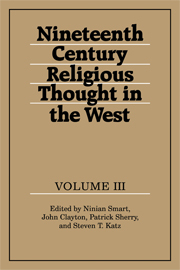Book contents
- Frontmatter
- Contents
- Preface
- 1 RELIGION AND SCIENCE
- 2 FRIEDRICH NIETZSCHE
- 3 JEWISH THOUGHT
- 4 THE STUDY OF THE OLD TESTAMENT
- 5 THE STUDY OF THE NEW TESTAMENT
- 6 FRIEDRICH MAX MÜLLER AND THE COMPARATIVE STUDY OF RELIGION
- 7 THE ANTHROPOLOGY OF RELIGION: BRITISH AND FRENCH SCHOOLS
- 8 MAX WEBER AND GERMAN SOCIOLOGY OF RELIGION
- 9 ERNST TROELTSCH
- INDEX
3 - JEWISH THOUGHT
Published online by Cambridge University Press: 26 January 2010
- Frontmatter
- Contents
- Preface
- 1 RELIGION AND SCIENCE
- 2 FRIEDRICH NIETZSCHE
- 3 JEWISH THOUGHT
- 4 THE STUDY OF THE OLD TESTAMENT
- 5 THE STUDY OF THE NEW TESTAMENT
- 6 FRIEDRICH MAX MÜLLER AND THE COMPARATIVE STUDY OF RELIGION
- 7 THE ANTHROPOLOGY OF RELIGION: BRITISH AND FRENCH SCHOOLS
- 8 MAX WEBER AND GERMAN SOCIOLOGY OF RELIGION
- 9 ERNST TROELTSCH
- INDEX
Summary
Background
In this chapter we shall attempt to present a typological analysis of the philosophical interpretations of Judaism which arose over the course of the nineteenth century. We do not refer here to the interpretation of Judaism given in the great non-Jewish philosophical systems of this period, as is indeed the case in the systems of Kant and Hegel, or of Schopenhauer. Instead, we confine ourselves to the philosophical interpretations conceived by philosophers of Judaism who, as Jews, tried in their own way to justify Judaism or to present it as a viable religious and systematic structure vis-àvis other religions and within the context of the modern world. From the latter point of view, systematic philosophical interpretations of Judaism, prompted by and conceived within the modern context are to be viewed not only within the framework of the history of philosophical systems but also, in part, under the aspect of what is called the history of ideas or intellectual history – in German Geistesgeschichte.
We emphasize the last point because it will become clear that problems inherent in the modern situation have their impact on the formulation of systems of Jewish philosophy in two major directions: there were modern systems whose consequences, in terms of both tools of interpretation and thematic shifts, had a major influence on the interpretation of Judaism.
- Type
- Chapter
- Information
- Nineteenth-Century Religious Thought in the West , pp. 71 - 108Publisher: Cambridge University PressPrint publication year: 1985

